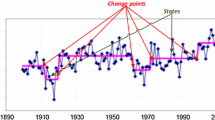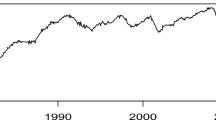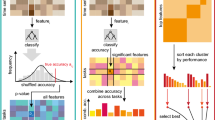Abstract
Adaptive methods of signal analysis have proved a very useful tool for analysis of non-stationary signals. This is due to the ability of these methods to adapt to the local structures of the signals being analysed, as these methods are not constrained by a fixed basis. Empirical mode decomposition (EMD) is among the more recent data-adaptive signal decomposition methods, which decomposes a given signal into modes which are hierarchically arranged based on their frequency content. In this paper, we will present a novel adaptive hierarchical decomposition scheme based on a novel modification of EMD, namely empirical mode decomposition-modified peak selection (EMD-MPS). EMD-MPS allows a time-scale-based signal decomposition, thereby allowing control over the decomposition process, not possible in the original EMD algorithm. Using time-scale-based decomposition and the properties of EMD-MPS, a given signal can be decomposed into octave frequency bands, with the centre frequency of the separated modes given by the frequency separation criterion of EMD-MPS. The spectral limits of the separated bands are established, and their relation with the centre frequency derived empirically. The method is validated by its application to simulated and real signals.






Similar content being viewed by others
References
Abolghasemi, V., Ferdowsi, S., Sanei, S.: Fast and incoherent dictionary learning algorithms with application to fmri. Signal, Image Video Process. 9(1), 147–158 (2015)
Chen, J., Glover, G.: BOLD fractional contribution to resting-state functional connectivity above 0.1 Hz. NeuroImage 107(2015), 207–218 (2015)
Chen, Q., Huang, N., Riemenschneider, S., Xu, Y.: A B-spline approach for empirical mode decompositions. Adv. Comput. Math. 2006(24), 171–195 (2006)
Colominas, M.A., Schlotthauer, G., Torres, M.E., Flandrin, P.: Noise-assisted EMD methods in action. Adv. Adapt. Data Anal. 4(4), 1–11 (2012)
Cordes, D., Haughton, V., et al.: Frequencies contributing to functional connectivity in the cerebral cortex in resting-state data. Am. J. Neuroradiol. 22(7), 1326–1333 (2001)
Flandrin, P., Rilling, G., Goncalves, P.: Empirical mode decomposition as a filter bank. IEEE Signal Process. Lett. 11(2), 112–114 (2004)
Fleureau, J., Nunes, J.C., Kachenoura, A., Albera, L., Senhadji, L.: Turning tangent empirical mode decomposition: a framework for mono- and multivariate signals. IEEE Trans. Signal Process. 59(3), 1309–1316 (2011)
Hong, H., Wang, X., Tao, Z.: Local integral mean-based sifting for empirical mode decomposition. IEEE Signal Process. Lett. 16(10), 841–844 (2009)
Huang, N.E., Shen, Z., Long, S.R., Wu, M.C., Shih, H.H., Zheng, Q., Yen, N.C., Tung, C.C., Liu, H.H.: The empirical mode decomposition and the Hilbert spectrum for nonlinear and non-stationary time series analysis. In: Proceedings of the Royal Society of London. Series A: Mathematical, Physical and Engineering Sciences,vol. 454(1971), pp. 903–995 (1998)
Kaleem, M., Cordes, D.: A novel method for investigation of frequency dependency of resting state functional connectivity. In: Proceedings of Human Brain Mapping Conference, Honolulu, Hawaii, USA, Program No: 2317 (2015)
Kaleem, M., Guergachi, A., Krishnan, S.: A variation of empirical mode decomposition with intelligent peak selection in short time windows. In: Proceedings of the 38th International Conference on Acoustics, Speech, and Signal Processing (ICASSP 2013), Vancouver, Canada, pp. 5627–5631 (2013)
Kaleem, M., Guergachi, A., Krishnan, S.: EEG seizure detection and epilepsy diagnosis using a novel variation of empirical mode decomposition. In: Proceedings of the 35th Annual International Conference of the IEEE Engineering in Medicine and Biology Society (EMBC), Osaka, Japan., pp. 4314–4317 (2013)
Kaleem, M., Guergachi, A., Krishnan, S.: Empirical mode decomposition based sparse dictionary learning with application to signal classification. In: Proceedings of IEEE Digital Signal Processing and Signal Processing Education Workshop (DSP/SPE), Napa, California, USA., pp. 18–23 (2013)
Liu, Y., Zhou, W., Yuan, Q., Chen, S.: Automatic seizure detection using wavelet transform and SVM in long-term intracranial EEG. IEEE Trans. Neural Syst. Rehabil. Eng. 20(6), 749–755 (2012)
Looney, D., Hemakom, A., Mandic, D.P.: Intrinsic multi-scale analysis: a multi-variate empirical mode decomposition. Proc. R. Soc. A 471(2173), 1–28 (2015)
Niang, O., Delechelle, E., Lemoine, J.: A spectral approach for sifting process in empirical mode decomposition. IEEE Trans. Signal Process. 58(11), 5612–5623 (2010)
Pustelnik, N., Borgnat, P., Flandrin, P.: A multicomponent proximal algorithm for empirical mode decomposition. In: Proceedings of the 20th European Signal Processing Conference (EUSIPCO 2012), Bucharest, Romania, pp. 1880–1884 (2012)
Shoeb, A.: Application of machine learning to epileptic seizure onset detection and treatment. Ph.D. thesis, Massachusetts Institute of Technology (2009)
Shokrollahi, M., Krishnan, S.: Non-stationary signal feature characterization using adaptive dictionaries and non-negative matrix factorization. Signal, Image Video Process. 10(6), 1025–1032 (2016)
Wu, Z., Huang, N.E.: Ensemble empirical mode decomposition: a noise assisted data analysis method. Adv. Adapt. Data Anal. 1(1), 1–41 (2009)
Yang, Y., Deng, J., Kang, D.: An improved empirical mode decomposition by using dyadic masking signals. Signal, Image Video Process. 9(6), 1259–1263 (2015)
Author information
Authors and Affiliations
Corresponding author
Additional information
This work was supported by National Sciences and Engineering Research Council of Canada (NSERC).
Rights and permissions
About this article
Cite this article
Kaleem, M., Guergachi, A. & Krishnan, S. Hierarchical decomposition based on a variation of empirical mode decomposition. SIViP 11, 793–800 (2017). https://doi.org/10.1007/s11760-016-1024-0
Received:
Revised:
Accepted:
Published:
Issue Date:
DOI: https://doi.org/10.1007/s11760-016-1024-0




